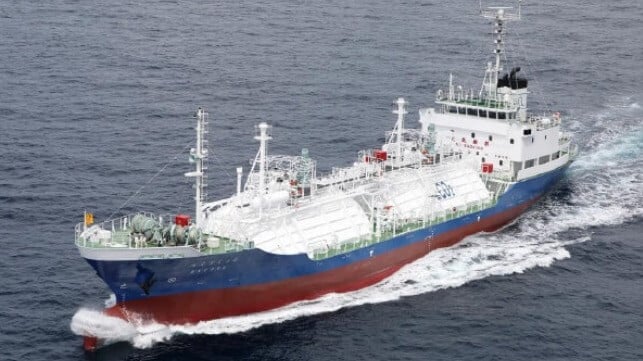Mitsubishi Shipbuilding Advances Concept for Smaller LCO2 Carrier

Mitsubishi Shipbuilding Co. working in conjunction with Nippon Gas Line continues to make progress on the development of its concept for a liquified CO2 carrier vessel. While much of the focus in the industry is on the need for more and larger CO2 carriers to meet the anticipated needs of the carbon capture and storage industry, this project focused on a specialized LCO2 carrier tailored to the coastal market in Japan.
Mitsubishi has been actively promoting the development of LCO2 carriers and the establishment of CCS value chains. In a project working with Nihon Shipyard Co., it is jointly pursuing the development of an ocean-going liquified CO2 carrier while working with NYK they developed concepts for a vessel that could transport both CO2 and ammonia. Another project that also involves Nippon Gas Line looks to develop the value chain including moving the captured CO2 to Malaysia for storage under the seabed.
Demand for LCO2 carriers is expected to grow in tandem with CCS (carbon dioxide capture and storage) projects involving marine transport of CO2 captured in Japan to storage sites. Mitsubishi Shipbuilding and Nippon Gas Line worked jointly on a study exploring the need to transport CO2 captured at smaller sites in the Seto Inland Sea area and transport it to overseas storage sites.
Mitsubishi Shipbuilding in late 2023 completed the construction of a small-scale demonstration LCO2 carrier with a cargo tank capacity of 1,450 cubic meters. The project sponsored by the Japanese government was to develop expertise in the sector and was followed by a program to establish standard specifications and designs for LCO2 carriers along with a focus on the steps to establish a construction supply chain.
Mitsubishi Shipbuilding and Nippon Gas Line have now completed a concept study for a low-pressure type coastal LCO2 carrier for the needs of emitters in the Seto Inland Sea area. ClassNK (Nippon Kaiji Kyokai) reviewed the designs and awarded Approval in Principle for the carrier to serve in coastal transport. The study explored domestic storage sites or acting as a feeder operation for overseas shipping.

that matters most
Get the latest maritime news delivered to your inbox daily.
The companies expect the AiP certification to support the efforts to develop opportunities for highly versatile small-sized LCO2 carriers to consolidate CO2 collection in Japan for transfer through overseas shipping.
Previously, the companies have said the goal would be to start construction on LCO2 carriers by 2027. They anticipate beginning a commercial service by 2028.
